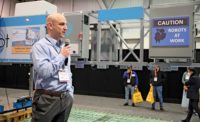Rebar-Tying Robot Debuts on Pennsylvania Bridge

A prototype of the so-called TyBot did a test run on a Pennsylvania bridge last month, tying rebar at a rate of 5.5 seconds per splice. Its creators hope to commercialize it in 2018.
PHOTO COURTESY OF ACR

Tying rebar is a repetitive task that always faces a shortage of human labor.
PHOTO COURTESY OF ACR


On a Pennsylvania bridge last month, a prototype robot tied more than 24,000 rebar intersections at a rate of 5.5 seconds each. Its creators are preparing to make it commercially available to contractors next year.
Brayman Construction debuted the so-called TyBot on the Freedom Road bridge project in Beaver County, Pa. Tybot’s arm dangles over each rebar intersection, working from a frame that spans the width of the new bridge deck. In the demonstration, Tybot completed more than 5,000 sq ft of deck, according to Jeremy Searock, co-founder of Advanced Construction Robotics (ACR).
Searock and his staff hail from Carnegie Mellon University’s Robotics Institute. They were recruited by Brayman Construction founder and CEO Stephen Muck, who came up with the idea of TyBot after seeing a CMU robotics event two years ago, he says.
“They were displaying several of their technologies. I was sitting in the audience, thinking about the challenges in the heavy-civil market and how that technology might help solve our labor issues,” Muck recalls.
Muck focused on rebar-tying, an arduous and monotonous job for which bridge contractors always have problems finding enough workers, he says. He met with members of the Robotics Institute, who spent eight months on proof of concept. The formation of ACR came next. “We’ve built a team of eight and developed what you now see as TyBot,” says Muck.
Lifted via crane onto existing construction infrastructure, the robot is overseen by one supervisory operator, who monitors quality assurance and reloads the tie-wire spool. ACR says it may reduce the amount of installation labor by 50%.
Jim Foringer, acting district executive for the Pennsylvania Dept. of Transportation’s District 11, received a report from his staff on TyBot’s work on the 100-ft-long bridge. “What we especially like is that the ties were very tight,” he says. “It missed a couple of spots, where the support chair [was] too close to the intersection. That’s why a person is there to monitor.”
Muck says Indian, Australian, Korean and a half-dozen U.S. contractors already have inquired about the technology. “They’re interested in buying or renting them—mostly in getting them on their jobs soon. The urgency is really there,” he says.
Union Buy-In
Muck met with Philip Ameris, president of the Pittsburgh-based Laborers District Council of Western Pennsylvania, notifying Ameris and the council of plans to deploy TyBot. “He was very interested and, frankly, refreshingly supportive of the technology,” says Muck. “He actually wanted to talk with pension trustees about investing.”
ENR was unable to connect with Ameris by press time. ACR is now in the process of raising $4 million for commercialization via Grouse Ridge Capital LLC. “As we develop the product, we will spin it out as TyBot LLC,” says Muck. “We expect to be selling and leasing the machines next year.” It is too early to pin down the cost of renting or buying. ACR is focusing on refining the prototype and the manufacturing process.
“I’m very excited,” says Foringer. “Rebar-tying is repetitive and back-breaking work. People are amazingly fast, but, over time, it’s just tough work. There’s a shortage of folks wanting to do it. TyBot will fill that need. And once it’s more efficient, it has the potential to shorten construction timeframes.”





